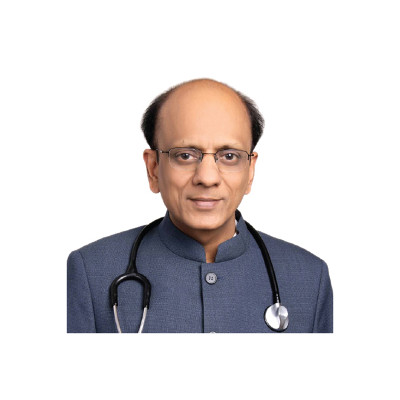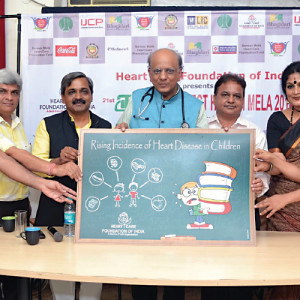

With India facing a heart disease epidemic and soon to acquire the title of the Heart Disease Capital of the World, there is an urgent need of a National Cardiovascular Control programme, shares Padma Shri Awardee Dr K K Aggarwal, Honble Secretary General, Indian Medical Association and President, Heart Care Foundation of India with Elets News Network (ENN)
Sir, its quite interesting to see your involvement with different platforms and stakeholders of Indian healthcare. In the light of this, do you think enough measures and communication campaigns are being undertaken to address the growing demand of cardiac diseases.

The medical fraternity faces several issues and threats in todays day and age and is often misunderstood. My role as the Honorary Secretary General of the Indian Medical Association, which is the largest representative organisation of doctors of modern scientific medicine, has beento ensure that the voice of Indian doctors is heard both within the country and outside. We have been fighting tirelessly to safeguard the interests of the doctors with respect to the increasing incidence of violence against them, misrepresentation, especially in the National Council of Educational Research and Training (NCERT) books as being corrupt, inclusion in the consumer protection act and the unjust rules of the Pre- Conception and Pre-Natal Diagnostic Techniques (PCPNDT) Act.
As the president of Heart Care Foundation of India, a non-government organisation (NGO) I founded in 1987 with the sole aim of working towards a healthier India, I have been working towards the cause of preventive health and helping those who are in need of medical intervention, but are unable to afford treatment. A few activities, which are running successfully today, include:
- Perfect Health Mela: A preventive health fair that has been taking place in the national capital for over 21 years in collaboration with the Government of India. The five-day event sees participation of over 5,000 school and college students, 4,000 nurses and medical students and is visited by 1 to 2 lakh people on a year-on-year basis. All competitions, activitiesand events at the Perfect Health Mela are centred around health themes.
- Hands-Only Cardiopulmonary Resuscitation (CPR) 10 Training Campaign: In the past two years,we have trained over 1.5 lakh people on the essential life-saving technique of hands-only CPR 10 for revival after sudden cardiac arrest. We also hold three Limca Book of World Records in this regard for the maximum number of people trained in one day, one location and one hour.
- Sameer Malik Heart Care Foundation Fund: Through this initiative, we provide technicaland financial assistance to anyone belonging to economically weaker sections of the society in the need of cardiac intervention. We believe that no person should die of heart disease just because they cannot afford treatment.
With India facing a heart disease epidemic and soon to acquire the title of the Heart Disease Capital of the World, I believe that our country is in urgent need of a National Cardiovascular Control programme. Presently, the focus of the government is only on the prevention and management of communicable diseases. A public-private partnership in this regard can go a long way.

| Sir, the average age of a person suffering with heart diseases has come down drastically and the rate of coronary heart disease in the Indian community is almost twice as high as their western counterpoints. What will be your recommendations for our youngsters to tackle this problem?
Indians are 17 times more prone to suffering from heart attacks than their western counterparts. I have developed an easy-to-learn formula of 80 to live up till the age of 80 without a heart attack: Dr KK formula of 80 for living up to 80 without a heart attack
|

Dr KK Aggarwal during one of the activities at Perfect Health Mela
As an advocator of preventive and universal healthcare, what measures do you think need to be undertaken to take care of critical areas, such as health financing, health infrastructure, skilled human resources, etc., particularly in cardiology segment where cost of treatment continues to be exorbitant and the incidence of cardiovascular diseases (CVDs) being higher in both rich and poor population.
The following steps will ensureuniversal healthcare in the long run:
- Primordial cardiac care
- Health budget should be 5 per cent of the annual gross domestic product (GDP)
- Reducing the cardiac disease burden through a preventive cardiac care programme
- Wellness parameters, such as more jogging tracks, reducing blood pressure of the community, and reducing salt and trans fat intake of the society
| Universal Healthcare |
|
Please enumerate innovations that have taken place across the cardiac value chain and collaboration among various stakeholders, including the government, providers, pharmaceutical companies, medical technology firms and health insurers to enable cardiac care interventions.
- Now costly device are available on an equated monthly installment (EMI)
- Leadless pace makers have come up
- Beating bypass is a reality
- After stenting, the patient can be discharged the same day
- Cardiac transplant is becoming a routine
- Aortic valve is now replaced without surgery
- Stents have become affordable
- Absorbable stents are nowavailable
- Hybrid catha labs are now a routine
- Congenital heart surgeries are saving lives
Most of the stakeholders in the Indian medical sector know that you have been the pioneer in the field of clot-dissolving therapy for heart attacks and bringing the technique of colour Doppler echo cardiography. Could you please highlight the infrastructural challenges that you have encountered as a cardiologist?
- In 1987, when I brought 2D colour Doppler echo technology to the country, there were no cardiac hospitals in Delhi. Now, we have advanced to three-dimensional (3D) echo.
- Today India is as developed in terms of healthcare technology and treatment as any other country in the world.
- I have been witness to patients dying due to the lack of angiography facilities in the past, which is not the case today and indicates how far we have come.
- Clot-dissolving therapy today has become the gold standard in situations where emergency stenting cannot be done in acute heart attack cases.
Be a part of Elets Collaborative Initiatives. Join Us for Upcoming Events and explore business opportunities. Like us on Facebook , connect with us on LinkedIn and follow us on Twitter , Instagram.












